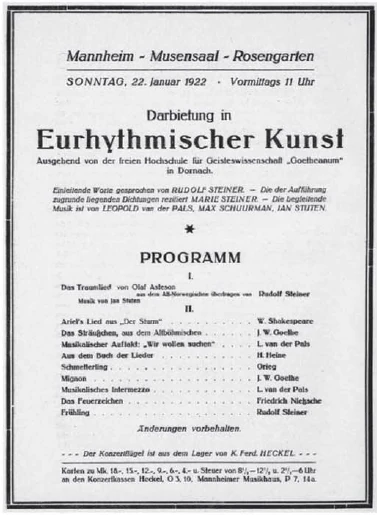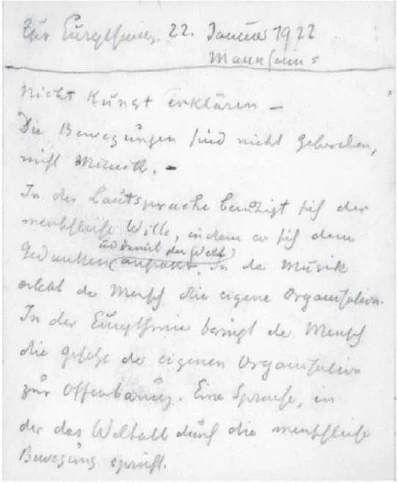The Origin and Development of Eurythmy
1920–1922
GA 277c
22 January 1922, Mannheim
Translated by Steiner Online Library
The Goetheanum eurythmy group performed in various cities in January and February 1922. In addition to Mannheim, they also performed in Hamburg (Jan. 29), Breslau (Feb. 1), and Prague (Feb. 5). It is not entirely clear where Rudolf Steiner himself gave the speeches. The printed program for Hamburg states “Introductory words by Leopold van der Pals,” while the performance or dressing room diary states “Introductory words by R. Steiner.” In Breslau, Rudolf Steiner presumably gave a speech, of which no records exist (according to the performance diary). Due to a railway strike, the onward journey from Breslau to Prague proved extremely difficult for the eurythmists, as Tatjana Kisseleff recounts; according to her testimony, Rudolf Steiner did not accompany them on this trip.
Notes on the speech Not explaining art—

The movements are not gestures, / not facial expressions.—
In spoken language, the human will calms itself by adapting to thoughts and thus to the world. In music, humans experience their own organization. In eurythmy, humans reveal the laws of their own organization. A language in which the universe speaks through human movement.
Die Goetheanum-Eurythmiegruppe führte im Januar und Februar 1922 in verschiedenen Städten auf. Neben Mannheim auch in Hamburg (29. Jan.), Breslau (1. Febr.) und Prag (5. Febr.). Es ist nicht ganz klar, wo Rudolf Steiner selbst die Ansprachen hielt. Auf dem gedruckten Programm für Hamburg steht «Einleitende Worte von Leopold van der Pals», während im Aufführungs- oder Garderobetagebuch «Einleitende Worte R. Steiner» steht. In Breslau hielt Rudolf Steiner vermutlich eine Ansprache, von der keine Aufzeichnungen vorliegen (laut Aufführungstagebuch). Wegen eines Eisenbahnerstreiks gestaltete sich die Weiterreise von Breslau nach Prag für die Eurythmisten äußerst schwierig, wie Tatjana Kisseleff erzählt; ihrem Zeugnis zufolge war Rudolf Steiner auf dieser Reise nicht dabei.

Notizen zur Ansprache

Nicht Kunst erklären—
Die Bewegungen sind nicht Gebarden, / nicht Mimik.—
In der Lautsprache beruhigt sich der / menschliche Wille, indem er sich dem /
Gedanken und damit der Welt anpasst. In der Musik / erlebt der Mensch die
eigene Organisation. / In der Eurythmie bringt der Mensch / die Gesetz der
eigenen Organisation / zur Offenbarung. Eine Sprache, in / der das Weltall
durch die menschliche / Bewegung spricht.

